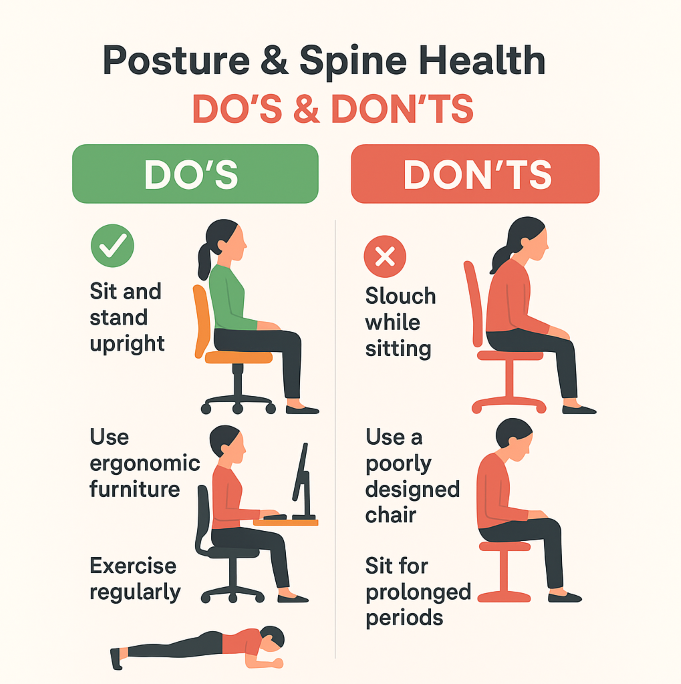Our spine is the central pillar of our body, providing support, stability, and flexibility for movement. Yet, one of the biggest threats to spinal health today is poor posture. Whether it’s long hours of sitting at a desk, constantly bending over mobile screens, or sleeping in awkward positions, bad posture silently takes a toll on the spine. Over time, it can lead to chronic back pain, neck stiffness, spinal deformities, and even nerve compression.
The good news is that most posture-related spine issues are preventable with awareness and lifestyle adjustments. In this blog, we’ll explore how posture affects spine health, the do’s and don’ts to maintain a healthy back, and practical tips to protect your spine in everyday life.
Why Is Good Posture Important?
Posture is the way we hold our body while standing, sitting, or lying down. Good posture aligns the body so that the spine, muscles, and joints are in balance, minimizing stress and strain.
Benefits of Maintaining Good Posture:
- Keeps bones and joints aligned properly.
- Reduces wear and tear of spinal discs.
- Decreases the risk of chronic back and neck pain.
- Improves breathing and circulation.
- Enhances energy levels and focus.
- Boosts confidence and body image.
On the other hand, poor posture—like slouching or hunching forward—places excessive pressure on the spine and muscles. Over time, this leads to discomfort, stiffness, and structural problems such as kyphosis, scoliosis, or cervical spondylosis.
Common Posture Mistakes That Harm the Spine
Before diving into the do’s and don’ts, it’s important to recognize everyday posture mistakes that many people unconsciously make:
- Slouching at a Desk – Rounding the shoulders and bending the neck while working.
- Tech Neck – Constantly looking down at phones or laptops.
- Crossing Legs for Long Periods – Causes imbalance in pelvic alignment.
- Sleeping on the Stomach – Twists the spine unnaturally.
- Carrying Heavy Bags on One Shoulder – Creates uneven pressure on the spine.
- Prolonged Sitting Without Breaks – Leads to stiffness and weak muscles.
Correcting these habits is the first step toward better spinal health.
Posture & Spine Health: Do’s ✅
1. Sit Upright with Proper Support
- Keep your back straight and shoulders relaxed.
- Use a chair with lumbar support or place a small cushion at your lower back.
- Keep your feet flat on the floor and knees at hip level.
2. Align Screens at Eye Level
- Adjust your computer or laptop so the top of the screen is at eye level.
- Hold your mobile phone at eye height instead of bending your neck down.
3. Take Frequent Breaks
- Every 30–40 minutes, stand up, stretch, or walk around.
- Simple stretches like shoulder rolls, neck tilts, and spinal twists help ease tension.
4. Sleep in the Right Position
- Use a firm mattress and supportive pillow.
- Sleeping on your back or side is better than lying on your stomach.
- Ensure your neck and spine remain aligned during sleep.
5. Strengthen Core Muscles
- A strong core supports the spine and maintains posture.
- Include exercises like planks, yoga, or Pilates in your routine.
6. Lift Objects Safely
- Bend at the knees, not the waist.
- Keep the object close to your body and use your legs to lift.
7. Stay Physically Active
- Regular exercise keeps muscles flexible and strong.
- Walking, swimming, or cycling are spine-friendly activities.
Posture & Spine Health: Don’ts ❌
1. Don’t Slouch While Sitting or Standing
Slouching increases pressure on the spinal discs and weakens back muscles over time.
2. Don’t Sit for Long Hours Without Moving
Sitting continuously tightens hip flexors and weakens core muscles, leading to back pain.
3. Don’t Sleep on Very Soft Mattresses
An overly soft surface doesn’t support spinal alignment, increasing strain.
4. Don’t Carry Heavy Bags on One Shoulder
Backpacks or handbags carried on one side cause imbalance, leading to neck and back pain.
5. Don’t Hunch Over Devices
Looking down at a phone for hours creates “tech neck” and accelerates cervical spine problems.
6. Don’t Ignore Early Pain Signals
Neck stiffness, mild back pain, or tingling in the arms should not be ignored. These may be early signs of spinal stress.
Tips for Maintaining Good Posture at Work
Since most posture-related issues come from desk jobs and long working hours, here are a few office-friendly tips:
- Adjust your chair so your knees are at 90 degrees.
- Keep your monitor directly in front of you, about an arm’s length away.
- Place your keyboard and mouse close to avoid overreaching.
- Rest your elbows at 90 degrees and keep shoulders relaxed.
- Use a standing desk if possible to alternate between sitting and standing.
Exercises for Better Posture
Incorporating posture-correcting exercises into your daily routine can significantly improve spine health:
- Chin Tucks – Helps strengthen neck muscles and reduce forward head posture.
- Shoulder Blade Squeezes – Relieves tension and strengthens upper back.
- Cat-Cow Stretch – Increases spine flexibility and eases stiffness.
- Wall Angels – Improves shoulder and upper back mobility.
- Planks – Strengthens core muscles for better spine support.
Long-Term Benefits of Maintaining Good Posture
Practicing good posture consistently not only prevents pain but also enhances overall well-being. The benefits include:
- Reduced risk of chronic spine conditions like sciatica, cervical spondylosis, and herniated discs.
- Improved lung capacity and better oxygen flow.
- Enhanced energy and reduced fatigue during the day.
- Better digestion due to reduced abdominal compression.
- Increased confidence and positive body language.
Conclusion
Your posture reflects your spine’s health. While poor posture may seem harmless in the short term, it can lead to serious spine-related complications over time. By following the do’s—like sitting upright, taking breaks, strengthening core muscles—and avoiding the don’ts—like slouching, hunching over devices, and prolonged inactivity—you can protect your spine for the long run.
Remember, prevention is always better than cure. Start making small adjustments today, and your spine will thank you tomorrow. A strong, healthy spine ensures not just freedom from pain but also better energy, mobility, and quality of life.
For Consultation Contact us on 9158681158 / 9168746986
.
.
.
#pune #pcmc #medical #medicalservices #spinesurgeon #backspecialist #sciatica #sciaticnerve #sciaticapain #sciaticatreatment #spinesurgery #spinespecialist #spinedoctor #backpaindoctor #endoscopicspinesurgery #orthopaedicsurgeon #mistlifsurgery #cervicalpain #spinalcord #rediculopathy #backpainrelief #slippeddisc #spine #neckpain #spinalstenosis #lumberlordosis #backbonesurgery













